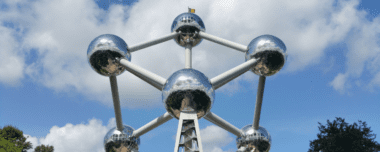Summary
- NextGenerationEU represents an opportunity for Irish companies to break into new markets or scale their presence in existing markets.
- EU member states heavily committed to upgrading the security of the public sector, while also funding improvements for private companies
- Click or scroll down for more information about the cybersecurity market in:
In the digital age, cybersecurity is crucial. Without strong protection, both public sector bodies and private companies are vulnerable to attack and being disabled by bad actors, whether those are criminal gangs or rogue states.
“It’s a relatively new sector, but the threat is global. Every sector and subsector is vulnerable to attack, although the public sector, banking and consumer goods companies tend to get more attacked than others,” says Raul Marigorta, Senior Market Adviser, Digital Technologies at Enterprise Ireland.
It’s no surprise that the EU is deeply committed to cybersecurity. Its Cybersecurity Strategy is a key component of the €2 trillion Recovery Plan for Europe and every government in the region is committing huge budgets to shoring up cybersecurity.
As Marigorta points out, this doesn’t just involve larger companies and public sector bodies, but also small to medium-sized enterprises (SMEs), which can be especially vulnerable to attack.
The rise of hybrid working and teleworking has compounded the risk. ‘In the past everyone was working from one physical location with one firewall,” says Marigorta, “but now maybe 50% of employees are spread in different locations. Normally people have simple wi-fi access points and non-protected routers at home, and that gives bad actors a way in. Cybersecurity today must be multi-device and multi-location.”
Need to protect against a variety of attacks
As Marigorta points out, high level catch-all protection may have been sufficient for organisations in the past, but as threats get deeper and more varied, more complex solutions are needed.
“The sector is not mature and threats are changing continuously,” he says. “You can control the threat today, but a new one is coming tomorrow that needs a new solution. Multiple risks need multiple solutions.”
That means plenty of opportunity for innovative cybersecurity firms, who can find a specific niche in the market and excel there. Ireland already has a strong cybersecurity cluster offering solutions across the range of needs from SMEs, large companies to public bodies, he adds.
Addressing the opportunity
Irish tech firms may not find it a complex challenge to pivot to cybersecurity as such, says Marigorta, but they should bear in mind there is a talent shortage when it comes to relevant programmers and software engineers. This is especially the case given that every sector needs to tackle cybersecurity.
He adds that companies entering this market also need to be mindful that offering support and maintenance is crucial. “You can’t just install software and forget it,” he says. “It needs to be updated regularly against new threats and attacks, it’s never static.”
On the upside, he points out that the need in different countries doesn’t differ much.
“This is a pan-European multinational issue,” says Marigorta. “The attacks are the same, whether you’re in London, Paris, Dublin or Madrid. That means once you are solving the problem in one place, you can solve it in different markets.”
He adds, however, that national regulations may differ, although there is broad collaboration across the EU on cybersecurity.
Expert advisors in Enterprise Ireland’s network of office across Europe, together with its Market Research Centre in Dublin can support your business as it investigates market opportunities, including by making local introductions and helping you to build your network.
Market snapshots
Benelux
One size doesn’t fit all across Belgium, Luxembourg and the Netherlands, where local practice and expectations can differ when it comes to buying cybersecurity solutions.

France

Italy
With attacks on the increase, both the government and the private sector in Italy are boosting budgets to grow cybersecurity protections.

Poland
While it has lagged in Europe, Poland is set to soar when it comes to cybersecurity, with extensive public sector initiatives and funding, and substantial private sector interest.

Spain
Spain is a sectoral leader, but specialist Irish firms and those that can help counter the cybersecurity skills shortage can certainly find opportunity there.




